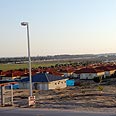
Evacuees say 'living in captivity'
Temporary site housing Gush Katif evacuees at Nitzan appears to embody report slamming government for their state, with crowded living conditions, substandard caravans, and dim prospects for permanent homes abiding
Aharon Farjun was once a farmer but since the evacuation has been working as a driving instructor. He spoke after a committee established to evaluate the condition of the Gush Katif evacuees published its findings, which include many mistakes by the State.
The caravan site at Nitzan appears to embody many of the failures listed by the committee, headed by retired Judge Eliyahu Matza.
The committee warned that "an undesirable perpetuation of the site at Nitzan may come about", and recommended that the temporary habitations be taken down by the end of the year, but for the evacuees residing there these words offer little consolation.
The State is currently constructing permanent homes at Nitzan, but only 150 families have won a lottery allowing them to live there. In addition, they say bureaucracy and legal battles are causing heavy delays in its completion.
The committee also found that many of the evacuees are unemployed and lack the funds to pay the expenses that come with owning their own home.
Despite the Matza committee's ruling in their favor, Chairman of the Gush Katif Settlers' Committee Doron Ben Shlomi said the evacuees "have no joy today".
Ben Shlomi told a press conference with several right-wing Knesset members that the communities and evacuees have been paying the price of the Gaza pullout for the past five years. "Nevertheless, we feel we have reached the beginning or the end of a certain chapter," he said.
The chairman said no report could relieve their pain, but that at least it had proved them right. "The committee determined that the failure and the responsibility rest with the state. The compensation by the government of Israel was stingy," he added.
The Matza committee said Tuesday it had found much to be desired in the temporary sites housing evacuees, with Nitzan being the largest of these. It said insufficient planning had gone into their construction, which led to a timeframe of just five months in which to prepare the sites.
"The limited timeframe had an effect on the price of the sites' establishment as well as the quality of the structures and the conditions of the contrasts signed with the hosting towns," the committee said in its report.
Indeed, thousands of complaints have been filed on the quality of the caravans in the three years since the Gush Katif evacuation. They lack insulation, which leads to expensive electricity bills, as well as fire extinguishing equipment. A number of electricity poles have also collapsed at the various temporary sites.
Illegal construction leads to crowded conditions
The committee also claimed the State's schedule of finding permanent residences for all of the evacuees within two years had been unrealistic from the beginning, yet this was what the government had prepared for.
This resulted in the prolonging of contracts and rent benefits, and occasionally even moving evacuees to other temporary sites, the committee said.
The Matza committee also found failures in controlling illegal construction at the sites. The committee's reports said natural developments at the temporary sites – including children who join their parents and necessary commercial structures added to the communities – had led to extremely crowded and unsafe living conditions.
Nitzan was deemed especially problematic by the committee because it houses a group of families living in dire financial need. Therefore the report urges the government to increase labor on permanent homes meant for those belonging to the group.
However the committee also recognized that the evacuees had been less than cooperative with the authorities, having exaggerated demands and avoided any independent action in helping themselves.
"Dozens of families residing in Nitzan lack mental energy, effective leadership, motivation, and the tools to arrive at the goal of owning their own home," the report says. "There is real concern that the sites will become, with the passing of days, slums and maybe even areas of abnormal behavior."
The report also gives the government a deadline for completing the relocation of evacuees to permanent residential buildings, at least in most of the communities, for the end of 2011. It also demands the government set a rigid timetable for the completion of tasks by all relevant parties within a period of three months at the most.
Shmulik Grossman contributed to this report










